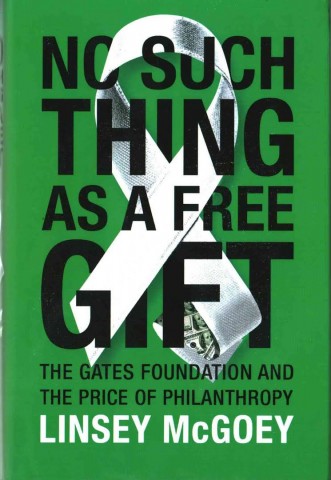"No Such Thing as a Free Gift: The Gates Foundation and the Price of Philanthropy" by Linsey McGoey (2015) provides critical perspectives on the role of foundations, and more generally on philanthropy. However, the book makes a series of questionable linkages and claims, without which it would have been a much stronger book. Attempting to drive home a point with less-than-factual claims weakens the overall argument, which is unfortunate as the topic requires more critical discussion.
Contextualizing philanthropic action:
- "…many philanthropists, both today and in the past, earned their fortunes through business strategies that greatly exacerbate the same social and economic inequalities that philanthropists purport to remedy. The great industrialists of the late nineteenth and early twentieth centuries were dubbed robber barons due to the widespread condemnation of their predatory business tactics.Today, some of the world's most celebrated philanthropists, from Gates to George Soros, earned billions through business tactics that have compounded financial instability, eroded labor protections, and entrenched global economic inequalities." (p. 9)
- "Through his foundation, he's [Gates] spent hundreds of millions in tax-deductible grants to convey the public message that aid 'works.' Unfortunately, the belief that aid 'works' is a simplistic and, in many ways, misguided one. It's a notion that diverts attention away from the realities of misplaced research priorities by the world's most powerful pharmaceutical companies, blankets understanding of how trade laws infringe upon national manufacturing and importing capacity, and obscures the role that global financial markets play in creating worldwide food instability." (p. 27)
I did not set out to write a critique of this book, but as I read the examples of problematic claims stood out and I began to make note of them. As a result, this is not an exhaustive list, and focuses largely on the last ~75 pages, after which my note taking (frustration) began. Here are a few examples:
- A Gates Foundation "partner" is a company the endowment has invested in (p. 173, p. 216). The author could certainly argue for a different meaning of partnership, but that is not the normative or legal sense of the word.
- Some claims are not well thought out: For example, the author argues that if aid was working well, there would be no need for communications work to promote it (p. 203). This assumes that humanitarian activities in remote areas of places like Ethiopia or Myanmar are accessible and regular reading material of global audiences, and are presented in diverse ways to meet the needs of diverse audiences automatically.
- Research was presented about GMOs to show its harmfulness. However, (1) the research was not cited, and (2) the research was retracted by the publisher, which was not mentioned by the author.
- A number of the claims made require details and evidence to support them, and broader perspectives to contextualize the extent, rather than relying upon assumption and hyperbole (p. 223).
- Misused quotes (e.g. p. 227). For example, when Gates was talking about Coca-Cola, he was using a supply chain example, not supporting everything the company ever did. He was suggesting there are examples of successful ways to provide goods to all people, not endorsing every action, of all times, that the company has been involved in.
- Misplacing blame: While the spending and practices of "Coca-Coca [sic] and Monsanto's" is not usually affected by CSOs, the author has failed to speak about the role of national governments - which is crucial - and the interaction that CSOs have with their national governments, which are approving these companies to operate and setting regulations. Much more attention (and blame) must be given to governmental authorities. The author writes as if companies can do anything they want, and work anywhere they want, so long as they do not break a law, and in doing so has neglected governments entirely.
- Odd statements: For example: "Perhaps they were well paid, perhaps they weren't" (p. 246). If it is important enough to include in the book, it is important enough to find out.
The author is making important arguments. And, I hope future work is strengthened so that these important works are not diluted with problematic claims. As it stands, I do not recommend the book.


